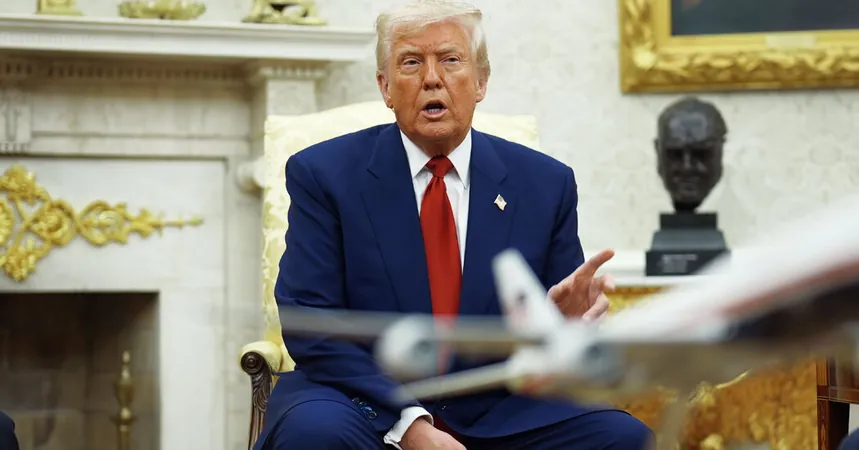
Trump’s Tariffs Spark Volatile Market Reactions: What You Need to Know!
2025-04-07
Author: Ming
In a dramatic twist in the ongoing trade war, former President Donald Trump staunchly defended his global tariffs, claiming they have raked in billions for the U.S. economy despite an increasingly pessimistic outlook among investors. The S&P 500 index experienced wild fluctuations, with losses hitting as much as 4.7 percent before the trading day concluded with a marginal drop of 0.2 percent.
As global fears surrounding tariffs escalate, many analysts express deep concerns regarding potential disruptions to supply chains, rising inflation, and an impending recession. "This volatility is likely to persist, particularly given the administration's steadfastness on tariff policies," cautioned Ed Yardeni, a prominent Wall Street analyst.
Trump's recent statements have only fueled market anxiety. Just this Monday, he suggested that the Federal Reserve lower interest rates, a move that the Fed's chairman warned could exacerbate inflation. Ignoring apprehensions, Trump touted the tariffs as a “very beautiful thing,” dismissing worries that they would burden consumers.
Global Impact and Market Reactions
The ripples of Trump's tariff enactments reverberated across Asian and European markets, with Hong Kong’s stock index plummeting by 13 percent, and Taiwan’s technology stocks losing a staggering 10 percent. The Pan-European index, Stoxx Europe 600, and the FTSE 100 in London also recorded declines of 4.5 percent and 4.4 percent, respectively.
In the commodities market, Brent crude oil prices were down more than 2 percent alongside a substantial drop in copper prices, raising alarms as the demand for these essential materials could weaken amid slowing U.S. and global economic growth. Since the tariff announcement, Bitcoin has taken a hit as well, falling below $78,000, demonstrating the cryptocurrency's vulnerability to market fluctuations.
Investors, particularly those nearing retirement, face growing anxiety over the potential depletion of their funds. Experts emphasize that timing the market can be perilous, and caution against making hasty financial decisions.
International Appeals and Negotiations
Several Asian nations including Bangladesh and Vietnam have sought relief from these tariffs, while others like South Korea and Japan are pressing for talks with the Trump administration. In a remarkable offer, the European Union proposed to eliminate tariffs on American exports in exchange for similarly favorable terms from the U.S.
Yet, debate rages on, with officials in the Trump administration like Peter Navarro accusing countries such as Vietnam of unfair trade practices. “If they want to come to us with zero tariffs, they need to address persistent issues of cheating,” he asserted.
Interestingly, Secretary of the Treasury Scott Bessent indicated that Trump might be open to negotiating, suggesting a careful calibration of the administration's aggressive stance towards international trade. Notably, highprofile business leaders, such as Elon Musk, have voiced opposition to the administration's tariff framework, further complicating the political landscape.
Looking Forward
Trump's tariffs—some set to reach as high as 104 percent—are a substantial threat to American consumers, especially for commonly used products imported from China. Potential retaliatory tariffs from impacted countries could intensify the existing tension, leading to a further downturn in the market.
As the trade war escalates, fears of recession loom larger. Wall Street officials warn of a significant decline in market stability if these tensions continue to rise. Yet, signs of a push towards negotiations from both sides suggest that there might still be hope for de-escalation.
In this tumultuous environment, many investors are left questioning what strategies might provide security in the face of uncertainty. A diversified approach focusing on less volatile assets might be prudent for those anxious about the market's future.
As the threats and negotiations unfold, one certainty remains: the economic landscape is changing rapidly, and those who monitor these developments closely may hold the keys to navigating through the storm ahead. Stay tuned for more updates on this developing situation!
 Brasil (PT)
Brasil (PT)
 Canada (EN)
Canada (EN)
 Chile (ES)
Chile (ES)
 Česko (CS)
Česko (CS)
 대한민국 (KO)
대한민국 (KO)
 España (ES)
España (ES)
 France (FR)
France (FR)
 Hong Kong (EN)
Hong Kong (EN)
 Italia (IT)
Italia (IT)
 日本 (JA)
日本 (JA)
 Magyarország (HU)
Magyarország (HU)
 Norge (NO)
Norge (NO)
 Polska (PL)
Polska (PL)
 Schweiz (DE)
Schweiz (DE)
 Singapore (EN)
Singapore (EN)
 Sverige (SV)
Sverige (SV)
 Suomi (FI)
Suomi (FI)
 Türkiye (TR)
Türkiye (TR)
 الإمارات العربية المتحدة (AR)
الإمارات العربية المتحدة (AR)